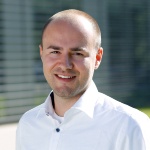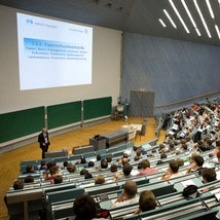Direct Links
- List of all current courses of the institute (C@MPUS)
- Announced theses (ILIAS)
No guarantee of completeness. The list is only accessible for students of Uni Stuttgart. Please contact the respective heads of the working groups for further information. - Job vacancies for student assistants
The advertised positions can be found on the official website of the university (Stellenwerk). Please contact the respective heads of the working groups for further vacancies. - Recognition of externally performed audit examinations
B.Sc. Aerospace Engineering – Courses at the Institute of Aircraft Design
An overview and details of all modules, courses and examinations in the Bachelor's programme (current examination regulations, LRT B.Sc. SPO 2019) can be found in C@MPUS.
The module Materials Science and Structures in Lightweight Construction is offered in cooperation with the Institute of Structural Mechanics and Dynamics in Aerospace Engineering. An overview of the module can be found in C@MPUS (Link). In this module, the Institute of Aircraft Design offers the following courses:
- Production technology and construction methods for lightweight structures (Lecture)
- Laboratory for Materials Science and Production Engineering (Laboratory)
These courses are offered in the winter semester and attendance is recommended for the 1st semester.
You can find an overview of the module in C@MPUS (Link). In this module, the Institute of Aircraft Design offers the following courses:
- Technical Drawing I (Lecture, exercise and voluntary exercise)
- Elements of Mechanical Design in Aerospace Engineering (Lecture, exercise and seminar)
The module runs over two semesters. The courses of Technical Drawing I are offered in the winter semester and attendance is recommended for the 1st semester. The courses of Elements of Mechanical Design in Aerospace Engineering are offered in the summer semester and attendance is recommended for the 2nd semester.
You can find an overview of the module in C@MPUS (Link). In this module, the Institute of Aircraft Design offers the following course:
- Design Seminar
This course is offered in the winter semester and attendance is recommended for the 3rd semester.
The module Aeronautical Engineering and Aeronautical Propulsion is offered in cooperation with the Institute of Aeronautical Propulsion Systems. You can find an overview of the module in C@MPUS (Link). In this module, the Institute of Aircraft Design offers the following courses:
- Aeronautical Engineering (Lecture and exercise)
The module runs over two semesters. The courses of Aeronautical Engineering are offered in the summer semester and attendance is recommended for the 4th semester.
M.Sc. Aerospace Engineering – Courses at the Institute of Aircraft Design
An overview and details of all modules, courses and examinations in the Master's programme (current examination regulations, LRT M.Sc. SPO 2014) can be found in C@MPUS.
The Institute of Aircraft Design is responsible for the following specialization areas:
- C: Information Technology in AE
- D: Construction Materials and Manufacturing Methods in AE
- F: Design and Construction of Aerospace Vehicles
Furthermore the course Aircraft Design I in the elective module Aerodynamics and Aircraft Design I is supervised by the Institute of Aircraft Design.
The following list contains all modules that are offered in M.Sc. Aerospace Engineering by the Institute of Aircraft Design (as of January 2024):
Research Field Lightweight Design, Simulation und Manufacturing Technologies
- Additive Manufacturing [SS]
- Composite Design and Manufacturing Seminar [WS]
- Composites modelling and simulation [WS]
- Composites United e.V. Trainee Programme [irregular]
- Construction Materials and Manufacturing Methods in Aerospace Engineering [SS]
- Construction Materials and Methods for Aeronautic and Space Engines [SS/WS]
- Experimental Lightweight Manufacturing Seminar [SS]
- Fatigue of composite materials [SS]
- Lightweight Construction I [SS/WS]
- Lightweight Construction I, II [WS]
- Material Testing and Identification for Composite Simulations [SS/WS]
Research Field Aircraft Design
- Aircraft Aerodynamics and Aircraft Design I [SS/WS]
- Aircraft Aerodynamics and Aircraft Design II [SS]
- Aircraft Design II [SS]
- Aircraft Design Seminar [WS]
- Airworthiness requirements and load assumptions [WS]
- Constructive Aspects of Aircraft Systems [SS/WS]
- Flight Characteristics and Performance in the Operational Environment [SS]
- Introduction to Helicopter Technology [WS]
Research Field Wind Energy
- Control of wind turbines and wind farms [WS]
- Sustainable energy- and traffic systems [SS/WS]
- Wind Energy 1 - Wind Energy Basics [SS]
- Wind Energy 2 - Planning and Operation of Wind Farms [WS]
- Wind Energy 3 - Wind Turbine Design [SS]
- Wind Energy 4 - Wind Energy Project [WS]
- Wind Energy 5 - Wind Energy Laboratory [WS]
Research Field Design Theory and Similarity Mechanics
- Art of Science of Systems Architecting [WS]
- Design Languages - Seminar [WS]
- Design of Algorithms, Data Structures and Design Languages [WS]
- Digital Product Development [SS]
- Seminar Systems Architecting [WS]
- Similarity Mechanics of Engineering and Artificial Intelligence [SS]
- Software Engineering [SS]
- Workshop Digital Design Methods [SS]
Key Competencies
- Helicopter Seminar [irregular]
- Sustainability and Responsibility in Aerospace [WS]
The module Aircraft Aerodynamics and Aircraft Design I is offered in cooperation with the Institute of Aerodynamics and Gas Dynamics. You can find a module overview in C@MPUS (Link). In this module, the Institute of Aircraft Design offers the courses:
- Aircraft Design I (Lecture and exercise)
Responsible: Priv.-Doz. Dr.-Ing. Stephan Rudolph
The lectures in specialization area C at the Institute of Aircraft Design cover the entire field of data processing. Modern methods for information technology modelling - for example the Unified Modeling Language (UML) - are taught. The focus is on linking the fundamentals of engineering with modelling and programming in information technology. The aim here is to show the broadest possible spectrum of applications of information technology methods in the product life cycle of engineering.
You will find an overview of all modules offered in specialization area C under: C@MPUS > [200] > [210] > [213] Information Technology in AE
Responsible: Prof. Dr.-Ing. Peter Middendorf
Lectures and seminars are offered in this area of specialization in the various material classes with (aerospace-specific) application and production relevance. The focus is on lightweight material construction with modern materials, design methods and manufacturing processes. The goal is an engineering education with a broad spectrum of background knowledge in structural mechanics, modelling and simulation, test engineering, etc., covering all materials.
You will find an overview of all modules offered in specialization area D under: C@MPUS > [200] > [210] > [214] Construction Materials and Manufacturing Methods in AE
Verantwortlich: Prof. Dr.-Ing. Andreas Strohmayer
This specialization is aimed at designers, developers and generalists. The focus is on application-oriented lectures. The emphasis here is on gaining the broadest possible overview of the overall system of the aircraft or spacecraft.
You will find an overview of all modules offered in specialization area F under: C@MPUS > [200] > [210] > [216] Design and Construction of Aerospace Vehicles
Courses of the Stuttgart Wind Energy (SWE)
In the course "Wind energy 1 - Fundamentals of Wind Energy" the students gain knowledge about the basics of wind energy, especially about the physical and technical principles of modern wind turbines. Students will be able to derive simple physical equations and correlations and to understand and explain their significance in relation to the use of wind energy. Based on an understanding of the individual sub-disciplines (aerodynamics, structural dynamics, electrical engineering, etc.), the students will be able to explain the structure and functionality of the overall wind turbine system and carry out elementary design calculations in selected areas. After completion of the course, the students have built up the essential competences which enable them to familiarise themselves with special fields in the field of wind energy (wind farm planning, control engineering, modelling and simulation etc.).
Further information can be found on C@MPUS.
Supervising employees: Nico Ruck and Fabian Schurig
The students acquire the basic technical understanding for the planning of a wind farm. They acquire the necessary knowledge about regulatory, economic and ecological issues in connection with the construction and operation of wind farms.
Further information can be found on C@MPUS.
Supervising employee: Umut Özinan
The students have an understanding of the system of an entire wind turbine. They can determine numerical and experimental loads on wind turbines. They can use load calculations to design the most important components and the overall system. The students are able to apply simulation programs using the example of a typical multi-MW wind turbine.
Further information can be found on C@MPUS.
Supervising employee: Qi Pan
In the course Wind turbine design II (Wind energy project), students work on a task in a team over a semester. This includes independent project management and processing of the work packages. The current focus of the wind energy project is wind measurement with UAS (Unmanned Aerial Systems), direct measurement (like hot wire anemometers) as well as indirect measurement (with flight data from UAS and machine learning methods to estimate wind speed).
Further information can be found on C@MPUS.
Supervising employee: Fabian Schurig
The students have an understanding of the system of an entire wind turbine. They learn the direct connection between theoretical fundamentals, metrological variables, evaluation and analysis by means of practical experiments. They have basic knowledge of measurement technology with regard to Strain gauges, current, voltage and acceleration. They can experimentally determine loads (forces and moments), electrical properties on wind turbines. They can present their evaluation steps and results to the group and reflect on and discuss the individual calculation methods.
Further information can be found on C@MPUS.
Supervising employee: Martin Hofsäß
Sustainable energy and transport systems provides an overview of relevant renewable energy technologies and new mobility concepts. Topics such as aviation and road traffic are dealt with. The event begins with a lecture series and ends with a group work with elaboration in text form, as well as presentation.
Further information can be found on C@MPUS.
Supervising employee: Prof. Dr. Po Wen Cheng
During this lecture students have the opportunity to gain a comprehensive understanding of the wind turbine control system. The dominant dynamics of the Widnenergieanlagen are presented. The processes for the development of standard controllers including filters and extended control loops are taught and their application is consolidated in exercises. After completion of the course, the students have built up the essential competences to work on current research questions in the field of control of wind turbines and wind parks.
Further information can be found on C@MPUS.
Lecturer: Prof. Dr.-Ing. David Schlipf
The lecture "Introduction to Renewable Energies" is an interdisciplinary lecture of different institutes. Within the framework of this lecture, knowledge in the fields of solar thermal energy, photovoltaics, hydropower, biomass and wind energy is imparted. The lectures on wind energy are taken over by the SWE. Overall, the lecture gives an initial overview of the various forms of renewable energy and their basic effects.
Further information can be found on C@MPUS.
Supervising employee: Nicole Frommer
Recognition of externally performed audit examinations
For questions concerning the recognition of externally performed examinations in the specialisations D and F, please contact the teaching coordination of IFB (for contact information see down below).
Questions on the following topics can be clarified:
- Preliminary check of eligibility
- Preliminary clarification of the thematic allocation to the areas of specialisation D and F
- Assignment as equivalent module
- ERASMUS: Learning Agreement
- Crediting of the audit work performed
- Submission of documents for recognition (certificates, module descriptions, forms, etc.)
If a preliminary clarification has already been carried out, please fill in the form and submit it for crediting of modules and/or module performances of the examination office. Please enter your information in the form header and leave the lower part of the document empty. Furthermore, a separate form must be filled in for each specialisation.
All courses currently offered at the Institute of Aircraft Design
Responsible employee

Jonas Mangold
M.Sc.Research Associate


